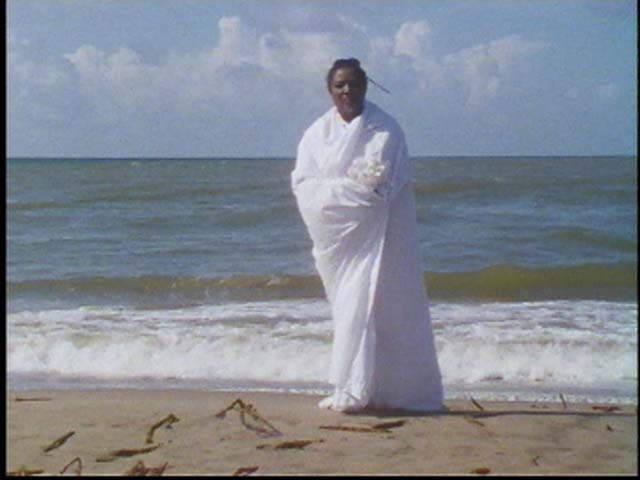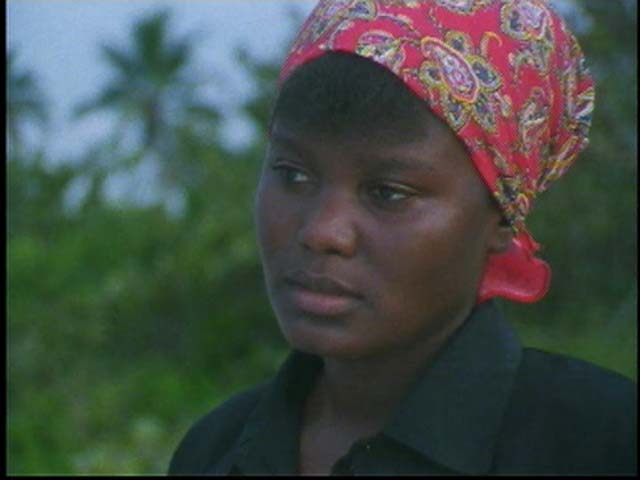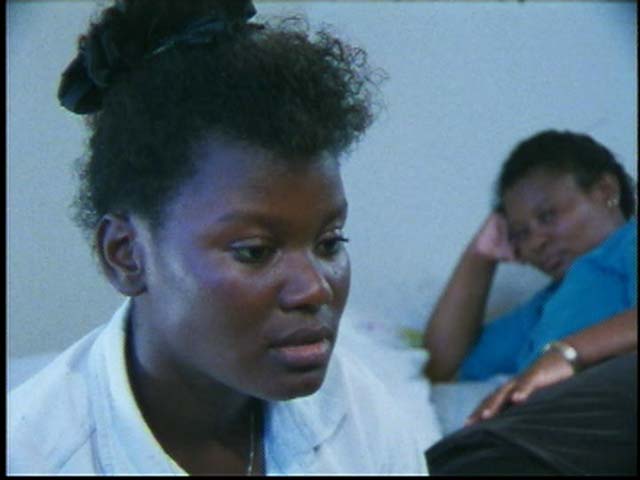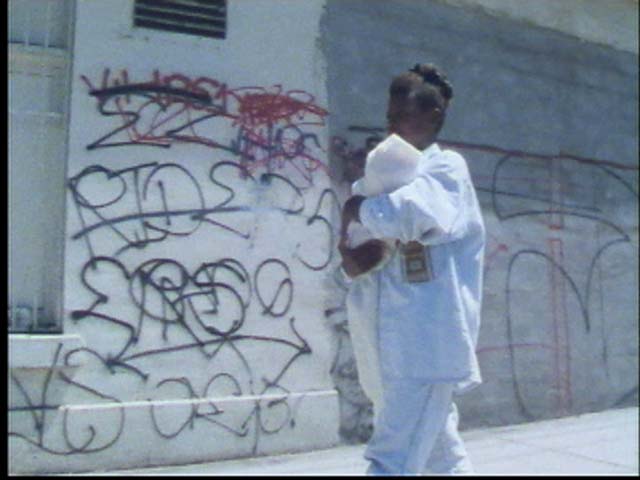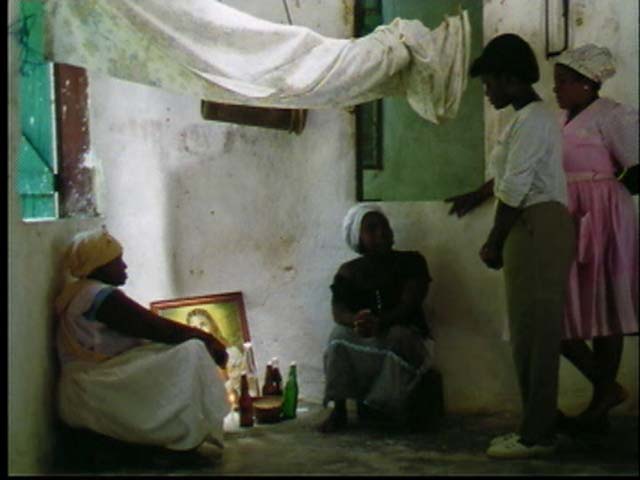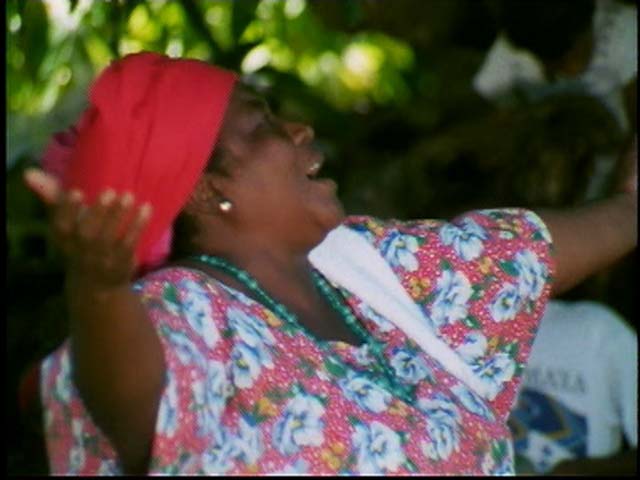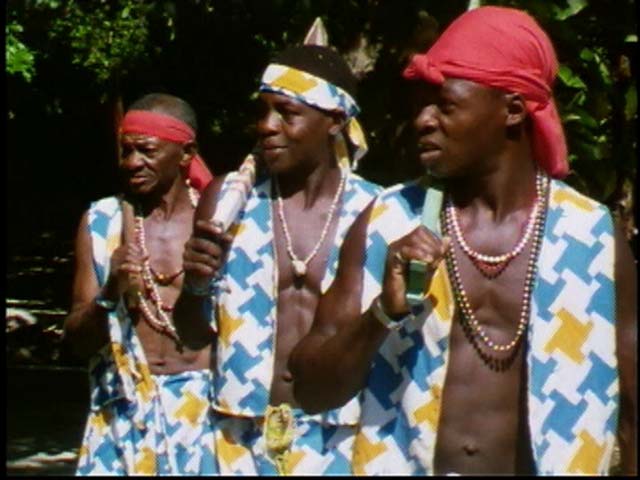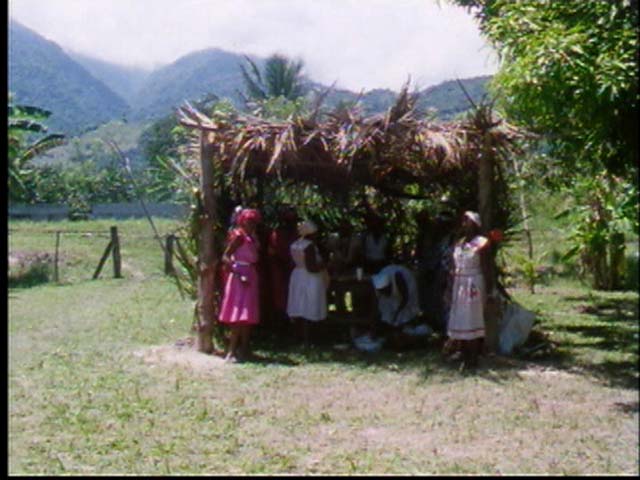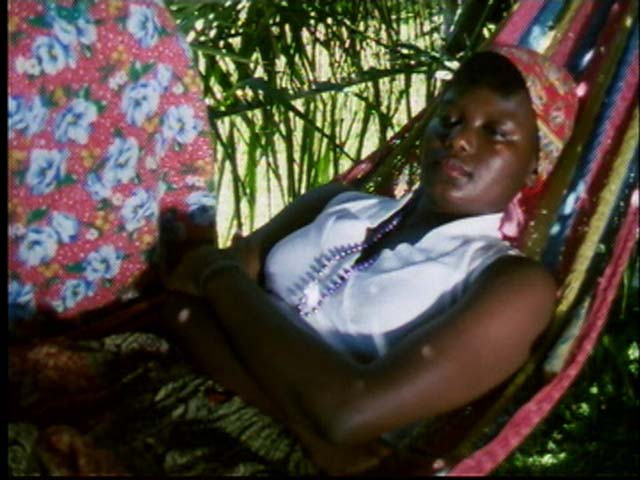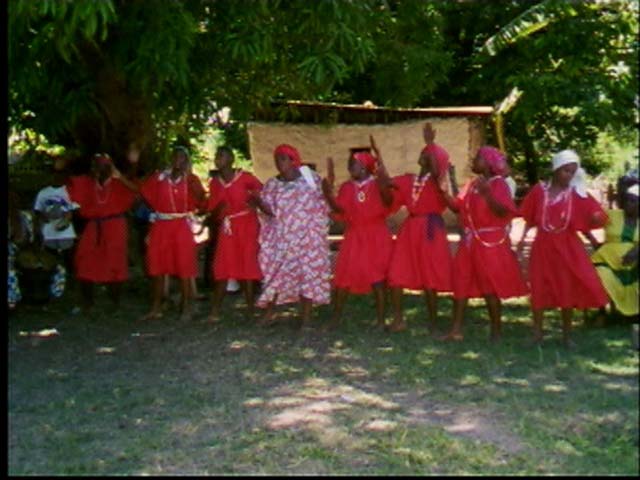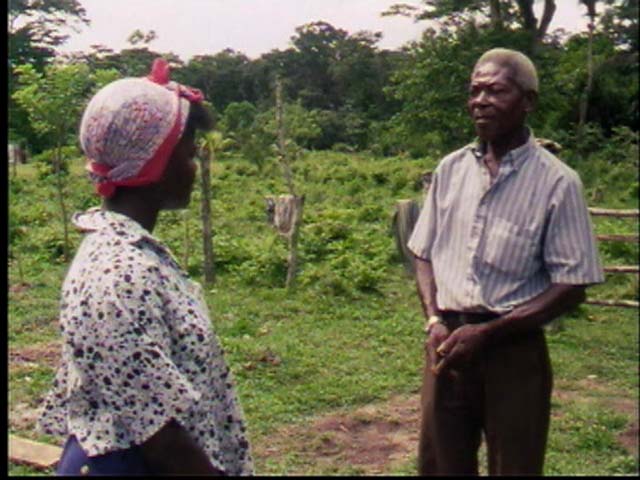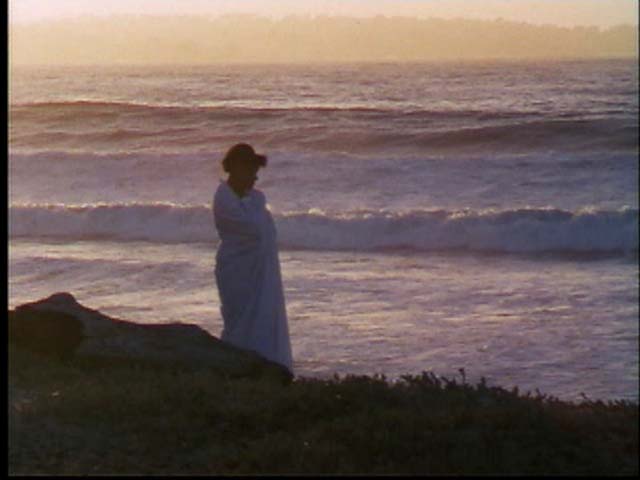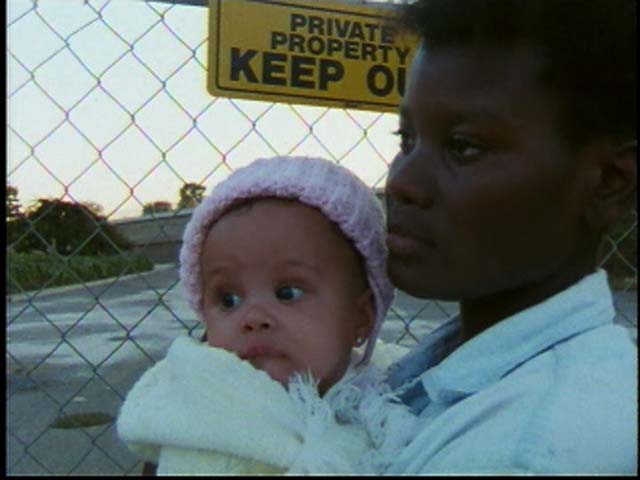EL ESPÍRITU DE MI MAMÁ (SPIRIT OF MY MOTHER)
Produced and Directed by: Alí Allié
Starring: Johana Martinez
Original Year of Production: 1999
Revised/Director’s Cut: 2017
Running Time: 59 minutes
Languages: Spanish with English subtitles
Countries of Production: USA/Honduras
Rating: Suitable for all audiences
SHORT SYNOPSIS:
A Garífuna woman journeys from Los Angeles to Honduras to give honor to her deceased mother, reacquaint herself with her own culture, and forget a past haunted by an American soldier.
MEDIUM SYNOPSIS:
Sonia, a Garifuna woman, leads a troubled life as a house worker in Los Angeles and is plagued by a haunting memory from her past of a relationship with an American soldier. Her efforts to escape her present circumstance and past trauma are fruitless until she has a dream of her deceased mother who calls upon her with a sacred request; to return to the coast of Honduras on a journey of self discovery and spiritual rebirth.
LONG SYNOPSIS:
Sonia, a young Garífuna woman from Honduras, leads a troubled life as an immigrant housekeeper in Los Angeles as she struggles to care for her infant daughter. She is plagued by haunting memories of her daughter’s father (an American soldier) and her recently deceased mother who appears in her dreams with a sacred request. Sonia searches for answers among the mundane city landscape, but finds few, until she realizes she must journey back to the North Coast of Honduras (La Mosquitia) to comply with her mother’s request. She learns from elders in her homeland how she must honor her mother so she may rest in peace. The result is much more than that, as Sonia begins to embrace her own nearly forgotten and stunningly rich cultural roots, as well as her identity as a mother to a daughter of her own. Set amidst the lush Honduran landscape and punctuated by traditional Garifuna music, El Espíritu de mi Mamá is a story about one woman’s transformation as she learns to embrace the past and move gracefully into the present.
Mill Valley Film Festival program notes by N. Isaacs
A meditative and dramatic tale of a young woman’s remarkable journey to her forgotten homeland. Sonia is a single mother living in Los Angeles, far removed from her Garifuna—West African, Arawak and Carib Indian—roots. Haunted by memories of an American soldier she once loved and dreaming of her dead mother, Sonia searches for answers among the mundane landscape, but finds few. After getting fired from her job as a nanny, Sonia journeys to Honduras to grant her mother’s request to perform a ceremony that will let her rest in peace. As her elders teach her the sacred Garifuna ritual, Sonia begins to embrace her own nearly forgotten and stunningly rich cultural roots, as well as her identity as a mother to a daughter of her own. Set amidst the lush Honduran landscape and punctuated by traditional Garifuna music, Spirit of my Mother is a story about one woman’s transformation as she learns to embrace the past and move gracefully into the present.
SXSW Film Festival program notes by Heather Courtney
Sonia is a Garifuna woman, raising a young daughter alone in Los Angeles. Disturbed by dreams of her deceased mother, Sonia journeys back to Honduras with her daughter and returns to her native village to seek guidance from relatives and elders. Through semi-documentary footage, we see Sonia reintroduced to the ceremony and rituals of her culture, and through this discovery of self- and cultural- identity, a healing process begins. An altogether original take on the mother/daughter story, The Spirit of My Mother (El Espíritu de Mi Mamá) is a unique film essay. Blending narrative and documentary techniques, director Allié tells the story of one woman’s quest to reach out to her mother, and to the ancestral traditions and endangered culture of the [Garifuna].
Festival de Cine de Bogotá program notes
En “El Espíritu de mi Mamá” se vive el mundo de discriminación que tienen que sufrir los inmigrantes ilegales en los Estados Unidos. La protagonista dejó su mundo, su pasado y su esencia misma, solo para encontrar al padre de su hija. Confrontada en sueños por el espíritu de su madre, quien le pide le de comer y beber, Sonia siente que no se encuentra en paz y que está sufriendo espiritualmente; la única forma de encontrar alivio es regresando de nuevo a su tierra, Honduras. Al llegar, Sonia se ve enfrentada a su pasado ancestral, con los ritos, la música y los sincretismos religiosos que toman como base esencial el legado de la cultura Africana. Solo con un ritual llamado Chugú, la protagonista logra dar de comer y beber, de forma simbólica, a su madre, y descubre que no solamente se está reconciliando con ella, sino que lo hace al mismo tiempo con su tierra y su cultura. Es así como se genera un reencuentro con ella misma.
City Search review by Amanda Morrison
Like a stranger in a foreign land, the viewer of Ali Allie’s evocative “El Espiritu de mi Mama” feels initially disoriented, knowing little about the context within which the film’s plot unfolds (unless said viewer happens to be a Honduran immigrant or an anthropologist). Neither the surroundings nor the timeline of the story are initially clear, as the film moves between the present and hazy flashback scenes, and between a vague Westernized setting (it turns out to be Los Angeles) and an exotic beach locale (Honduras, as eventually becomes clear). Perhaps this is Allie’s intention: to never allow [the] audience to be comfortable as voyeurs; to force them to feel like clueless tourists.
Although interesting as a self-reflexive strategy, it seems to run counter to the film’s overall intent, which is to expose viewers to the unique culture of the Garifuna. The Garifuna are people of West African descent who settled along the Atlantic coast of Belize, Honduras and Nicaragua after escaping a slave ship that ran aground in [1665]. Many argue they are the only African descended group on the American continent to have never been enslaved, and whose culture and traditions remain relatively intact.
But if Allie requires [the] audience to work a bit (you can’t just lean back and allow this exotic culture wash over you), “El Espiritu de mi Mama” ultimately becomes an eloquent meditation on the Garifuna. This meditation takes the form of a young woman’s journey to reconnect with her long-lost mother. A descendent of these original Garifuna, Sonia is a single mother who immigrated from Honduras to the United States but who still holds close ties to her native country. The film charts one specific trip home. In the spirit of much of Latin American literature and cinema, Allie weaves Sonia’s story in magical realist style. Understood this way, the film’s irregular pacing and nonlinear timeline seem less uncanny. The viewer comes to accept the fact that Sonia is searching not for her living mother but for her departed mother, who haunts Sonia in her dreams.
In those dreams, her mother appears not as a frightening apparition but as a benign figure who seeks only to be “refreshed.” Sonia travels from Los Angeles to her homeland to perform a ritual for her mother with other Garifuna relatives and friends. Elaborately staged with authentic sets, costume and music, the ritual is the high point of the film. As the Garifuna prepare food and libations for Sonia’s mother, the meaning of her strange request—to be “refreshed”—becomes clear. By being called upon to provide “refreshments” in this ritualized way, Sonia is led to refresh not only the memory of her mother, but of her motherland.
Some Other Film Festival Screenings
FESPACO (Burkina Faso), BLACK INTERNATIONAL CINEMA (Berlin), ZANZIBAR (Tanzania), URBAN WORLD (New York), THE WORLD (Montreal), JORNADA DE CINEMA DA BAHIA (Brazil), CINE LATINO (San Francisco), LOS ANGELES LATINO INTERNATIONAL, CINEMA OF THE AMERICAS (Miami), FILM ARTS (San Francisco), SAVANNAH, JAMAICA, AFRICAN DIASPORA (New York), PAN AFRICAN (Los Angeles), PAN-CULTURAL (Houston), ANN ARBOR, CHICAGO LATINO, ATHENS, CINE-FIESTA (Montreal), SMITHSONIAN NATIONAL MUSEUM (Washington DC)
Director’s Statement
El Espíritu de mi Mamá is a meditation on motherhood as well as an intimate look at aspects of Garifuna culture and tradition. It offers a glimpse into the underacknowledged presence of African culture and influence in Latin America, and is a testimony to the importance of honoring our mothers as well as our motherland. This film is not a documentary (and represents on screen only a small portion and limited dimension of Garifuna ritual), however I believe the film evokes enough of the spirit of what Garifuna spiritual practices achieve: to refresh our connections to our ancestors and pass on that refreshment to future generations, for these connections are a bridge, sacred and unseen, that must remain unbroken at all costs. Our very humanity depends upon it.
-Ali Allie

